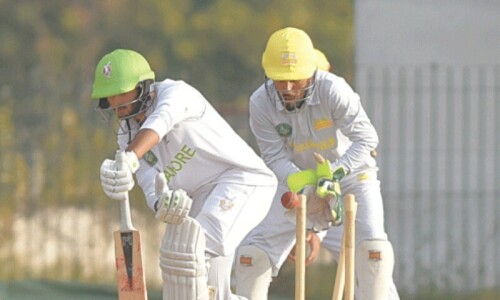
NOW that the Pakistan Halal Authority Bill needs only a formal nod of the Senate to become a law, many must be expecting a major breakthrough in halal trade.
But it may not come off too soon, given the anomalous nature of the organisational setup raised to regulate the trade.
The current arrangement, under which the Pakistan Halal Authority (PHA) will function, suffers from lack of synergy between the related bodies which can jointly run the project successfully. Pakistan National Accreditation Council (PNAC), which will play a central role in deciding about and issuing halal certification, is a subsidiary unit of the Ministry of Science and Technology and not of the Ministry of Religious affairs. The federal science and technology minister will head the PHA. The Ministry of Science, it is obvious, cannot be expected to have full know-how of promoting halal trade (which goods should be classified as halal or haram as defined by religion). Unless this anomaly is addressed, halal trade may not pick up.
What should have been the task of the ministries of commerce (trade promotion) and religious affairs (what is halal and haram) has been handed over to the science ministry. It is interesting to note that this ministry does not have the mandate to stop the sale or purchase of items that might contain ‘haram’ ingredients, according to Fazl Abbas Maken, secretary of the ministry. This, he told the Senate committee meeting, was a provincial subject to check the sale of items containing haram ingredients.
In March, the PNAC will hold a conference of Islamic scholars to review the list of items and ingredients that are acceptable under Islamic laws
PNAC Director General Ismat Gul Khattak while addressing the standing committee said that Pakistan wanted to establish its own accreditation system for halal foods instead of relying on the World Trade Organisation and its recommendations. But the federal science minister says that the PNAC has been created as a requirement of the WTO to reduce technical barriers to trade like other developed countries did.
In March, the PNAC will hold a conference of Islamic scholars to review the list of items and ingredients that are acceptable under the Islamic laws. The Chairman, Senate Standing Committee on Science and Technology, Osman Saifullah Khan told the meeting that the new law would help the government check the menace of adulteration in foodstuffs. Besides, it will address consumers concerns about the provenance of foodstuffs, cosmetics, pharmaceuticals, etc to know whether these have been prepared in accordance with, and conform to, Islamic principles.
The bill was passed by the National Assembly on December 6 and was sent to the Senate. The Senate’s committee approved the bill in its meeting on January 25 which was attended by only two senators besides the committee’s chairman. No wonder, under the rules this is the quorum required for holding meetings and passing bills.
Once the bill is passed and the Pakistan Halal Authority comes into existence, it will be the first and only legal entity at the federal level dealing with the halal sector. The provinces can legislate similar laws to set up their own bodies although the federal law will be applicable across the country. It will also mean initiating a plethora of steps towards enabling the country secure a reasonable share in the huge global halal market dominated by non-Muslim countries. Brazil is the largest player exporting halal products worth $4.73bn followed by India $2.11bn and Australia $1.63bn.
Currently, the presence of Pakistan’s halal products in export market is nominal owing to lack of a legal and recognised authority at the national level though having a huge potential of halal exports. At many places its halal products are not accepted by customers for absence of a halal logo by a certified agency or carrying a logo of uncertified agency.A recent survey showed that many consumers in China and Africa are unwilling to buy Pakistani products for this reason.
Many exporters are of the view that since Pakistan is a Muslim country their goods such as meat must be presumed to be halal and they need not carry a logo. The Pakistan Halal Authority will address such problems by raising awareness level of the exporters. No product shall be exported from Pakistan unless it bears the halal logo of the PHA, nor will any article be imported unless it has been certified as halal by an accredited certification body.
Published in Dawn, Business & Finance weekly, February 8th, 2016













































